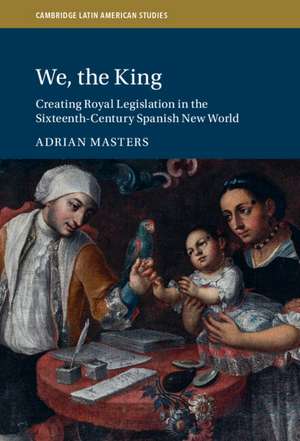We, the King: Creating Royal Legislation in the Sixteenth-Century Spanish New World: Cambridge Latin American Studies, cartea 127
Autor Adrian Mastersen Limba Engleză Hardback – 8 mar 2023
Din seria Cambridge Latin American Studies
-
 Preț: 200.79 lei
Preț: 200.79 lei - 9%
 Preț: 593.10 lei
Preț: 593.10 lei -
 Preț: 231.54 lei
Preț: 231.54 lei -
 Preț: 198.38 lei
Preț: 198.38 lei -
 Preț: 236.92 lei
Preț: 236.92 lei -
 Preț: 188.27 lei
Preț: 188.27 lei -
 Preț: 236.99 lei
Preț: 236.99 lei -
 Preț: 322.67 lei
Preț: 322.67 lei -
 Preț: 289.01 lei
Preț: 289.01 lei -
 Preț: 526.45 lei
Preț: 526.45 lei -
 Preț: 209.07 lei
Preț: 209.07 lei - 11%
 Preț: 691.66 lei
Preț: 691.66 lei -
 Preț: 257.52 lei
Preț: 257.52 lei -
 Preț: 290.63 lei
Preț: 290.63 lei -
 Preț: 238.63 lei
Preț: 238.63 lei -
 Preț: 234.31 lei
Preț: 234.31 lei -
 Preț: 156.72 lei
Preț: 156.72 lei - 11%
 Preț: 591.79 lei
Preț: 591.79 lei - 14%
 Preț: 732.69 lei
Preț: 732.69 lei -
 Preț: 325.38 lei
Preț: 325.38 lei - 11%
 Preț: 694.91 lei
Preț: 694.91 lei -
 Preț: 328.56 lei
Preț: 328.56 lei -
 Preț: 321.74 lei
Preț: 321.74 lei - 5%
 Preț: 306.74 lei
Preț: 306.74 lei -
 Preț: 287.07 lei
Preț: 287.07 lei -
 Preț: 284.98 lei
Preț: 284.98 lei -
 Preț: 287.66 lei
Preț: 287.66 lei -
 Preț: 284.39 lei
Preț: 284.39 lei -
 Preț: 318.84 lei
Preț: 318.84 lei -
 Preț: 287.28 lei
Preț: 287.28 lei -
 Preț: 191.51 lei
Preț: 191.51 lei -
 Preț: 322.51 lei
Preț: 322.51 lei -
 Preț: 236.72 lei
Preț: 236.72 lei
Preț: 594.06 lei
Preț vechi: 652.82 lei
-9% Nou
Puncte Express: 891
Preț estimativ în valută:
113.71€ • 123.56$ • 95.58£
113.71€ • 123.56$ • 95.58£
Carte disponibilă
Livrare economică 01-15 aprilie
Livrare express 15-21 martie pentru 37.92 lei
Preluare comenzi: 021 569.72.76
Specificații
ISBN-13: 9781009315418
ISBN-10: 1009315412
Pagini: 342
Dimensiuni: 152 x 229 x 22 mm
Greutate: 0.66 kg
Editura: Cambridge University Press
Colecția Cambridge University Press
Seria Cambridge Latin American Studies
Locul publicării:New York, United States
ISBN-10: 1009315412
Pagini: 342
Dimensiuni: 152 x 229 x 22 mm
Greutate: 0.66 kg
Editura: Cambridge University Press
Colecția Cambridge University Press
Seria Cambridge Latin American Studies
Locul publicării:New York, United States
Cuprins
List of figures; List of tables; Acknowledgments; Prelude: A Peruvian pestizo at the Spanish Court; Introduction: the collective making of an empire; 1. Paper ceremonies for a global empire: Gobierno petitions and the collective work of Voluntad; 2. The co-creation of the Imperial Logistics Network; 3. Distant kings, powerful women, prudent ministers: the gendered creation of the Council of the Indies; 4. Lawmaking in a portable council: Gobierno decision-making technologies before 1561; 5. 'Bring the Papers:' Royal decision-making and the power of archives in Madrid, 1561–1598; 6. Creating the royal decree: format, phraseology, and petitioners' transformation of Indies law; 7. Pedro Rengifo's epilogue: subjects of chance; Conclusions; Index.
Recenzii
'Meticulously researched and beautifully written, We, the King unveils the labyrinthine petitioning process involved in enacting thousands of legislative decrees and reveals how diligent vassals shaped colonial policies and categories of difference. It dismantles the standard view of the Spanish colonial state as the architect of legal rule that was all-seeing and all-pervasive. This outstanding work should be required reading for all colonial Latin Americanists.' Nancy E. van Deusen, author of Global Indos: The Indigenous Struggle for Justice in Sixteenth-Century Spain
'Adrian Masters has produced an ambitious study of early modern bureaucracy, law-making, and subaltern agency. Deeply researched and carefully written, We, the King is an indispensable resource for scholars of the Iberian empire.' Michelle McKinley, author of Fractional Freedoms: Slavery, Intimacy and Legal Mobilization in Colonial Lima, 1600–1700
'In this tour de force analysis of lawmaking in the early modern Spanish empire, Adrian Masters reveals that not only were the king's New World vassals co-creators of royal law, but most provocatively, that it was their petitions to the crown that helped codify the human differences that would inform the caste system.' S. Elizabeth Penry, author of The People Are King: The Making of an Indigenous Andean Politics
'Adrian Masters masterfully unpacks the powerful legal fiction of the King of Spain and Emperor of the Indies, demonstrating that the world's first global empire was a contingent and collective enterprise made by paper-peddling brokers and subalterns. A must read for anyone interested in the early modern history of empires and governance.' Mark Thurner, author of History's Peru: The Poetics of Colonial and Postcolonial Historiography
'Adrian Masters has produced an ambitious study of early modern bureaucracy, law-making, and subaltern agency. Deeply researched and carefully written, We, the King is an indispensable resource for scholars of the Iberian empire.' Michelle McKinley, author of Fractional Freedoms: Slavery, Intimacy and Legal Mobilization in Colonial Lima, 1600–1700
'In this tour de force analysis of lawmaking in the early modern Spanish empire, Adrian Masters reveals that not only were the king's New World vassals co-creators of royal law, but most provocatively, that it was their petitions to the crown that helped codify the human differences that would inform the caste system.' S. Elizabeth Penry, author of The People Are King: The Making of an Indigenous Andean Politics
'Adrian Masters masterfully unpacks the powerful legal fiction of the King of Spain and Emperor of the Indies, demonstrating that the world's first global empire was a contingent and collective enterprise made by paper-peddling brokers and subalterns. A must read for anyone interested in the early modern history of empires and governance.' Mark Thurner, author of History's Peru: The Poetics of Colonial and Postcolonial Historiography
Notă biografică
Descriere
Reveals how ordinary subjects in the New World aided and abetted law-making in the Spanish Empire.
